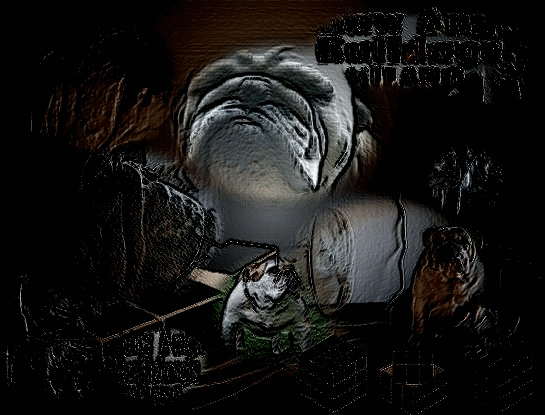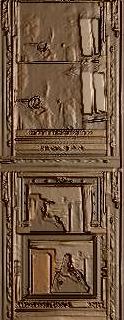Striker.

Son And Grandson Of Striker.





 CONTACT: originalbulldogclub@gmail.com
CONTACT: originalbulldogclub@gmail.com






Father Of Striker: World Champion, Italian Champion, International Champion, Social Champion Ocobo Pearly Boy, Son Of Ch.Ocobo Tully. Mother: Tuffnuts Snow Angel, Daughter Of Ch. Tuffnuts Striker, Son Of Living Legend
French Bulldog - English Bulldog - Homemade Animal Foods - 1904
As stated in the foregoing, puppies while young and growing require in proportion a more generous quantity of animal food for muscle and bone building than they will after they are mature and their structures are complete. This does not mean, however, that they should have a greater proportion of meat than mature dogs, for while yet they are very young, milk will supply them with all the needed materials; but it must prove insufficient after a time, and this comes much sooner with the large than with the small breeds.
Varieties Of Animal Foods
Narrowing the question to meat, as with mature dogs much depends upon existing circumstances. Manifestly a mastiff puppy requires more meat than a pointer, and a Yorkshire still less than the latter. Again, in all litters of reasonable size there are some that need more stimulating food than others, consequently they must be given larger proportions of meat.
In solving this problem the age must of course be considered, also the amount of exercise taken. For instance, in the first three months puppies are much less active than they are during the three following, consequently even were they able properly to digest large quantities of meat soon after the weaning they must not be given them lest their blood and systems be rendered impure thereby. But as they grow older and exercise more, and by this means more quickly eliminate the waste from their bodies, the proportion of meat can be safely increased, although in all instances it must be done gradually, and in some it will be found that the increase required from month to month need not be very great.
It is absolutely impossible, therefore, to fix a rule to govern the proportion of meat for puppies. Considering them as a whole, however, also the quantity of milk that they generally take and the number of meals they have daily, it can safely be accepted that about one-fourth is near right for them after they are three or four months old. But as already intimated it should be larger where they are of the largest breeds, provided always the increase is well borne and the growth more rapid and sturdy under it. On the other hand, the proportion should be less for smaller breeds, many of which will thrive and keep healthy and strong on a diet in which meat only appears occasionally and then in small quantities.
For excess in animal foods there are fixed penalties, and under some conditions of life they are more severe than for those of excess in vegetable foods. While the latter tends to the production of obesity, which in itself is a very serious matter, as with brood bitches, and to diseases especially of the skin, as eczema, the former strikes deeper, and lessens greatly functional activity and leads to an accumulation of impurities within the system.
These effects were well illustrated in two mastiffs, bred by the writer, which a few years ago excited much interest in breeders of their variety, for the reason that they were, as far as known, the largest pair ever raised from the same litter. Both were sold to the same gentleman, the dog puppy in the tenth week and his sister when eight and one-half months old. Their purchaser being an ardent believer in the theory that flesh alone is appropriate food for the dog, fed almost solely on it, and at the tenth month they were each accustomed to eat between four and five pounds daily. Marvellous development was the result, but it was attained at a terrible cost, for the dog died at maturity of what was called a cancerous disease, and his sister followed him in less than a year; she, according to the report of her owner, "breaking out with fearful sores, wasting rapidly and dying after a short illness."
It is reasonable to assume that these mastiffs living lazy, luxurious lives, were destroyed by excess of animal food. And it is a significant fact that the sister, which had been fed on a mixed diet until eight and one-half months of age, yielded to the excess after suffering from it for about the same length of time as her brother.
While considering the evil consequences of excess in animal food attention can properly be directed to the effects of excess in foods properly combined and in correct proportions. Among the most constant of these are disordered digestion, derangements of the bowels, vitiated secretions, torpid action of the vital organs generally, obesity, perverted nutrition, and as concomitants, fatty degeneration and organic diseases. Chronic or permanent distension of the stomach is another disastrous consequence of habitually overloading this organ; which, while it is doubtless frequently acquired after maturity, for obvious reasons far more often occurs during the early months of puppyhood. And it is well to add that once it becomes permanent it can never be overcome; and in after life there is always a tendency to indigestion, nutrition invariably suffers, and as a rule the victims are low in flesh no matter how wisely and generously they are fed.
The question of preparation of animal food deserves a passing notice. Undoubtedly flesh can be rendered more digestible by the means of cooking, and where that is rightly done, all things considered, it can justly be held as best under the usual conditions of life. But when the processes of cooking are faulty and the way in which they :are conducted is indifferent, speaking generally, it is safe to say that meat in its raw state would be better suited to digestion, provided it was in a form which rendered it easily accessible to the digestive fluids - that is, if it was torn or bruised and in small pieces.
Boiling is the method usually resorted to in kennels, it being the most convenient. Aside from the faults of "practice it is open to some quite decided objections, the most pronounced of which is, that it renders the muscular fibre difficult of digestion whether the same is a mass of hard strings, as it were, or finely divided. Soups in which the meat has softened down and " boiled away" are highly nutritious, yet although broken up in minute fragments the muscular fibre is scarcely more digestible than it was while in one mass; moreover these fragments are now enveloped in the gelatine of the meat, - extracted by the long continued high heat, - and this to some extent prevents their being acted on by the digestive fluids.
Notwithstanding this lessened digestibility of the meat, dogs are capable of disposing of these soups to good advantage if the quantity is properly restricted, but if in excess much of them is unaffected during their journey through the body, and is therefore wasted; and, besides, the digestive organs are very likely to rebel and become deranged in consequence of the imposition.
As for fresh meats cooked for the table, unless of course a perfect contempt for culinary laws is exhibited, they can safely be regarded as quite well suited to the digestion of dogs, also, as containing the most of the nutritive properties of these foods. And where dogs share the diet of their masters, or in other words are fed on scraps from the table, and the quantity of meat given them is ample, it is scarcely necessary to consider the question of quality or that of cooking.
But considering the popular method of cooking meat specially for dogs and the want of care which so many exhibit in its application, the conclusion is inevitable that under certain conditions of life they should be fed on raw meat while those conditions last.
That this may be accepted the fact is urged that no matter how scientific the process of cooking, alterations of a chemical nature are induced in meat and some of its nutritive elements are wasted. Were man perfectly familiar with all the inner workings of the dog's mechanism, the demands in the way of food and the peculiarities of his organs concerned in digestion, then the problem of supply required for the growth and health of the body and to renew the loss from wear and tear, etc., might possibly be worked out. But the dietician has yet to enter this province, and at present only rough estimates can be made, and a very wide margin must be left to cover the many conditions, fixed or accidental, of which little or nothing is known.
Thus far experience has shown the writer that bitches in-pup which are occasionally allowed raw meat during the periods of gestation and nursing are stronger and healthier, give whelp to more vigorous puppies and prove better support for the same, than bitches fed entirely on cooked meat during these periods - that is, on meat cooked specially for them. The reason for the superior qualities is of course problematical, but it would seem that either raw meat was more easily digested by them and more readily converted with less waste into materials for building, for renovation of the body, etc., than cooked meat, or that raw meat contained highly important elements in better forms or more correct proportions for the work in which they were engaged, and to support them while doing it, than cooked meat.
Experience has also shown that in many morbid states of the system not only is raw meat more acceptable to the digestive organs, but recovery takes place much more rapidly under its use than it does under the use of cooked meat. And another product of experience is the fact that puppies to which raw meat is given often and judiciously, thrive better, grow in structure with greater rapidity, assume more massive proportions and are less frequently ailing than those given cooked meat only, although the quantity of meat is the same in both instances.
But there is a bitter prejudice against the giving of uncooked meat to dogs because of the parasites which it sometimes contains. Beyond doubt this danger exists, for nations habituated to the use of raw meat are notorious harborers of tapeworms; but still the writer believes that much greater alarm is felt than is justifiable. Man is as easily infected as dogs, yet among people of civilized countries cases of tapeworms are never frequent, - in fact they are rare except in imagination, in which pictures of them are drawn by pretenders to medical skill, who have methods of their own for deluding their patients. And considering this rarity, also that cooking as often applied will not destroy the vitality of these parasites, raw meat cannot be nearly as fierce a menace as generally reputed.
This is true of the kinds of meat which appear on the table while yet partially cooked, or "done rare," as commonly expressed, but there are evidently animal substances -some of them are occasionally eaten by man often fed out to dogs, from which far greater danger is to be apprehended unless they are first submitted to a boiling temperature. Among such are the hearts, livers, lungs - called "lights" by many - paunches and other internal organs. Even greater danger lurks in the entrails of many animals; and these, whether from sheep, cattle, horses or game, should be given to dogs only after they have been thoroughly boiled for the purpose of destroying what parasites are present. The brains of certain animals, especially the sheep, are also a source of danger, which must exclude them from the diet until they have been treated in the same way as the entrails.
These dangers from so many different sources can, however, be easily obviated by observing the simple rule, to feed to dogs, while yet in the raw state, only good, sound and wholesome beef or mutton, and thoroughly cook all other flesh foods allowed them. This religiously adhered to, the danger of parasites from animal foods will be very slight indeed and need not occasion any uneasiness.
Breeders generally are much prejudiced against pork, and rightly so, for it is rich and burdensome to the digestive organs - in fact of all meats it is the most difficult of digestion. At the same time to what are called "scraps" by some and "cracklings" by others, which are the refuse of melting or refining, there can be no valid objection as an occasional ingredient of the diet of hardy dogs. But instead of giving them, as is sometimes the custom, as they are broken from the cakes, much the better way is to make soups of them and thicken the same with vegetable foods.
Although liver is nearly as deserving of prejudice as pork it frequently appears before dogs, and doubtless it is accountable for many mysterious attacks of diarrhoea, for it is one of the richest of foods and as difficult of digestion as it is rich. Considering which only an occasional and sparing use should be the rule.

French Bulldog - English Bulldog - Homemade Animal Foods
As for what are known as "lights," some writers recommend them, yet a person would not be likely to feed them to a house pet more than once, for they give the breath an intolerable stench, which can be accepted as unmistakable evidence that decomposition occurred and advanced far before the stomach completed its task.
In the giving of raw meat there are certain precautions to be observed which are well worth considering here. The dog commonly " bolts" the food placed before him largely because there is little if any necessity for him to do otherwise, but accustom him to foods which require mastication and the assistance of the saliva, and he soon shows that he has sense - or instinct - enough to know that he must chew them before he swallows them. In feeding raw meat the facts are often ignored that dogs have teeth for cutting and tearing, and that if the same are industriously used on this food it will be converted into a form favorable for digestion. As a consequence the erroneous practice of giving it to them in pieces but little smaller than the fist is a common one; and to this can be attributed many of the digestive disturbances of which breeders have occasionally complained and for which they have blamed the food.
It ought not to be necessary to urge that raw meat for dogs, old and young, that are fairly healthy and have good, sound teeth should when possible be put before them in a form which will make it necessary for them to cut, tear and crush it before it can be swallowed; or in other words it should be in very large pieces, and preferably attached to bones of good size. And when it cannot be obtained in suitable form it should be cut into small pieces or crushed with a mallet before it is fed out; or if intended for puppies or for the sick it should always be. minced or scraped.
It will scarcely do utterly to ignore without comment that ancient idea that meat injures the dog's "nose." Where this food is given intelligently its effect upon the scenting powers is transitory merely and limited solely to the period of active digestion. In other words, after he has eaten his fill of meat, for two or three hours his sense of smell is less keen, but as soon as digestion is well advanced it is restored and just as powerful as before eating. And it can safely be said that a sporting dog might be allowed meat from puppyhood until incapacitated by age and his "nose" would not in the slightest degree fall off in consequence of his diet. But meat will injure this sense if it is given out of proportion to the amount of work or exercise, for then the dog is sure to become feverish and his "nose" as well as his general health must fail him. And where such failure has occurred in consequence of meat it has been invariably due to the lack of judgment on the part of the owners - they giving too much of this food and too little exercise.
The habit of burying meat, so common among dogs, has been the subject of speculation, and two theories have been advanced in explanation. One is, that they do it to ripen it and render it more digestible - possibly, also, that it may acquire a richer flavor. Yet dogs often bury meat that is literally putrid, and the other theory seems the most plausible - that so great is their fondness for this food they will eat it in any form, and, like all animals of the same family, store away and conceal if possible for the future what remains after their appetites have been satisfied or their jaws have tired from gnawing.
The reader will do well to accept this solution of the problem, for otherwise he might assume that meat even in advanced stages of decomposition would be good enough and not impossibly preferable for his dogs. He may accept as a fact that all tainted meat is poisonous, although it is less so to dogs than to men because of their greater powers of resistance. In fact a quantity of food poison that would kill a man might not have any appreciable effect upon his dog. But notwithstanding this there are limits, and of course no one knows where they are placed; consequently the wisest and safest plan to pursue is to feed dogs on foods that are above suspicion.
It is well to add that of all animal foods none undergo poisonous changes as quickly as liver, and when but slightly tainted it is extremely likely to cause severe diarrhoea.
It is evidently a part of the plan of Nature that a relation should exist between the general character of an animal and its food, and in keeping with this flesh-eaters are in general bolder and more combative than the vegetable-eaters upon which they prey. The same relation also appears in animals that subsist on a mixed diet, and man affords one of the best illustrations of it. Assuming that he has been living on a diet in which the proportions of these foods are about three parts vegetables to one of meat, now let him increase the quantity of meat and lessen that of vegetables, and the chances are many that if of a refined and easy-going, well-balanced nature he will before many weeks show some gross qualities and become more or less peevish and exacting. And returning again to his original diet his good-natured disposition will be restored.
The same relation and about the same degree of intimacy exists in dogs, and one quiet and gentle while being fed largely on vegetables will more than likely become a little bolder and perhaps be less good-natured towards strangers. And in this case, as in the other, the animal food acts as a stimulant and arouses the natural ferocity, which although evidences of it may under ordinary conditions be wanting yet exists in every flesh-eating animal.
However, this action of meat upon dogs is not sufficiently intense to make it worthy of consideration; and where they have become savage under its generous use, were the truth known it would doubtless appear that in nearly all cases they had been much kept on the chain at the time, and the perversion of nature was due far more to the restraint than to the diet. In a word, treat a dog humanely, and his diet, no matter how generous the proportion of meat, will very seldom injure his nature.
Reverting to the culinary preparation of animal food, it is again urged that when the popular method, boiling, is applied, in every instance the water or broth be fed out with the meat because this contains important elements, extracted during the cooking, which the body must have for its support, especially if under heavy drains, as during gestation and nursing.
As practically stated, to occasionally vary the form of the meat in the diet from cooked to raw is advisable, but the latter can scarcely be wisely given with vegetables and starches, unless it is finely minced and so thoroughly mixed with them it cannot be picked out. Hence, when it is to be but a part of a feed, it should be withheld until the last, for the other foods might be left untouched - the keen edge of the appetite having been taken off by the much more palatable morsels.
As for bones, they have rightly been called the dog's tooth brush, for by means of them matters which accumulate on the teeth are largely removed. Those which are soft and can be easily crushed, as the body bones of calves, sheep, etc., should be given at frequent intervals, but hard bones endanger the teeth; and the small and dense, which sliver on breaking, are especially forbidden as likely to cause intestinal obstruction - an accident which has proved fatal to many valuable dogs.
A word as to horse-flesh. That of healthy horses which have been killed by accident or in consequence of accident can safely be accepted as good food for dogs, whereas the flesh of horses destroyed by disease should be considered dangerous, although of course it might not always be so.
Meat with all its bearings having been freely discussed, there remain for consideration a few other animal foods of value in the kennels; and these are milk, eggs, and fish.
Milk, Nature's first food for a certain class of animals, necessarily contains all the elements required for the growth of the body, and therefore it must be placed high in the list of materials at command for feeding dogs - old as well as young. But while a perfect food for the latter, its value lessens as age advances because its important elements are so diluted with water; and before a mature dog could obtain enough of them it would be necessary literally to swamp his alimentary canal. In fact, were it alone depended upon a dog of the largest variety would scarcely find support in less than a gallon of milk daily; and this quantity taken continually would speedily injure his digestive system; moreover, he would soon weaken unless kept much at rest, for while milk builds up tissues they cannot withstand very hard labor.
But notwithstanding all this, new milk is a valuable food for dogs of all ages, and beyond its supportive effects it has an admirable action on the skin and coat. And really no more solid rule can be fixed than to let all dogs make their breakfasts on it, either alone or thickening slightly with some of the starchy foods.
Skimmed milk, as all must know, is simply milk that has parted with a certain amount of its oleaginous matter or cream, while its tissue-building materials have all been retained. It is therefore nourishing, and merely lacks the force-producing elements of the milk.
As for buttermilk, this also contains all of any value except the fatty matter, while, like skimmed milk, it is scarcely less refreshing and nutritious than new milk; and those who cannot afford the latter should by all means, in summer certainly, be well supplied with one of the others - the cost of which is but a trifle comparatively - and give it to their dogs in generous quantities for breakfast.
The difference between the skimmed and the new is not likely to be noted; but buttermilk is at first less agreeable to the taste, yet a fondness for it is generally soon acquired, and it can always be gratified, for this milk is no burden to digestion, nor is it at all likely to affect the bowels unpleasantly, as many think it inclined to do.
Some dogs take kindly to sour milk, and if so it can safely be allowed them in reasonable quantities, but breeders will do well to withhold it from very young puppies, although within the experience of the writer it only occasionally does harm. As for its anthelmintic powers, which are generally thought to be considerable, if it possesses any such they are of small account.
This list of animal foods would be far from complete were eggs not included, for in conditioning the well and feeding the sick they could scarcely be dispensed with. Like milk they contain all the elements needed to sustain nutrition, yet some of them are greatly in excess of what would be required for support, while other and no less important essentials appear in such small amounts that in order to obtain all his system demanded, were a dog of the largest size to live on eggs he would be obliged to eat very nearly two dozen each day.
There is, of course, no truth in the popular saying that "an egg is as good as a pound of meat," for in proportion to its weight it is equally as nourishing as meat, and no more. But it has qualities which in some directions make it more valuable as a food than meat; and herein it greatly resembles cod-liver oil - for the yolk is very nearly one-third fat. In fact for medicinal purposes, the relative proportions of fatty matter duly considered, eggs are of no less value than that medicine.
When "spoon-feeding" is necessary, as in times of sickness and once in a while in conditioning for dog shows, no other food can approach the egg in importance, being as it is concentrated and so easy of digestion that even if the organs concerned in the process are enfeebled they are yet able to dispose of it speedily and advantageously.
Again, eggs are most efficient accessories, for the reason that quickly and easily digested and absorbed as they are - except of course when in large quantities - they scarcely lessen the appetite for other foods, hence can be given in the morning, also at noon if required in special cases, and the evening meal will generally be as acceptable and taken with as much relish as if it were the only one of the day. Beyond this, nearly all foods can be fortified by them without their presence being detected.
In feeding the sick, the whites as well as the yolks of eggs can be given in ail instances where the stomach will retain them; and when vomited, if the yolks are removed and only the whites administered not only will they generally remain on the stomach but have an agreeable, soothing action on its lining membrane.
To a dog that has fallen off in coat and is under weight no better dietetic treatment can be administered than plenty of new milk with one, two, or more - according to his size - raw eggs, lightly beaten up in it for breakfast, and the same number at noon in about half the quantity of milk taken in the morning. And if he is a dainty feeder, when night comes another egg or two can wisely be mixed with his meat.
If merely suffering from derangement a dog is quite sure to "pick up" quickly under this treatment, and he will very often do so even when down with disease; while in the presence of good health raw eggs can be given frequently, with the assurance that the dogs will be all the better for the change.
It is scarcely necessary to add that whether for man or dogs the eggs should always be fresh, for when stale, even if they have made no near approach to decay, they are far less easily digested than the new-laid.
The subject of fish is one soon disposed of. All kinds that have been recently caught and properly cooked can occasionally be used in feeding dogs, but merely to vary the diet, for while nutritious, as usually served they are not very digestible; moreover, dogs seldom show any fondness for this food and generally eat it under protest, as it were.
When it is to be prepared specially for dogs the method to be employed is boiling; and unless the fish are very large it is advisable to enclose them in bags made of thin and coarse materials before putting them into the kettles.
After thoroughly cooking with a few vegetables the "meat" should be picked from the bones and returned to the broth, which should then be thickened with bread or some starchy food that has been well cooked.
- ___Hoaxer_
-

- __Homepage
-

- Souvenirs Online
-

- ____ Hocum
-

- _____Grooming
-

- Homomorphism
-

- ____Homeboy
-

- ___Hooky
-

- ___House-Room
-

- _____Bull
-

- ____Hulking
-

- _____Hue
-

- ____Bulldog
-

- ____Hobby
-

- _____Bully
-

- ____Bullies
-

- ____Puppy
-

- ___Rules
-

- ___Hushed
-

- ____Skull
-

- ___Hygiene
-

- __Hygeian
-

- ___Illness
-

- ____Sickness
-

- ___Healing
-

- Book Exchange
-

- ____Females
-

- Funny Names
-

- ___Kennels
-

- ___Concerns
-

- _____Price
-

- ___Expo
-

- ____Girl
-

- ___Science
-

- ___For Sell
-

- ____Shop
-

- Cheap Puppy
-

- _____Clubs
-

- ____Images
-

- ____Animals
-

- ____News
-

- Hoary Problem
-

- __Nelson
-

- ___Polly
-

-



-

- ___Striker

-










